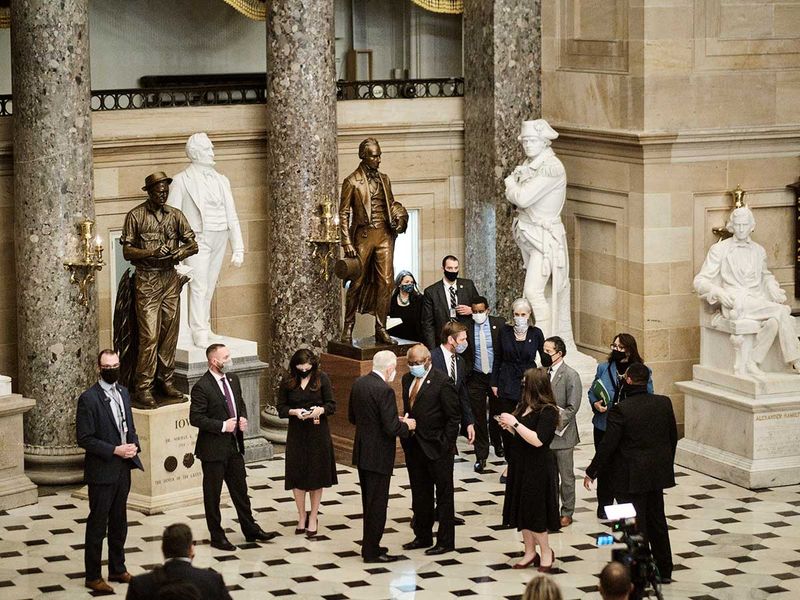Dubai: If you thought that the US would have a new president on Thursday morning after Donald Trump was impeached for the second time in his four-year term, you may be forgiven. The process of impeachment in the US is a little more complex, and in all likelihood the hearing to find out if Trump is indeed guilty will continue after he leaves the White House.
Impeachment by itself does not mean that the president is removed from office. It is a charge of misconduct brought against someone holding public office. The term is commonly used to mean removing someone from office, but it actually refers only to the filing of formal charges. If the House impeaches, the Senate then holds a trial on those charges to decide whether the officer — a president or any other federal official — should be removed and barred from holding federal office in the future.
The US Constitution states that a president can be impeached and removed from office for a number of reasons, including “treason, bribery, or other high crimes and misdemeanors.”
The impeachment itself came after chaos inside the US Capitol on January 6 when the police force that protects the legislative complex was overrun by a mob of Trump supporters.
The impeachment of President Trump by 232-197 votes on the charge of ‘incitement of insurrection’ comes merely days before he leaves office on January 20. This leaves us with more questions than answers.
Will Trump have presidential immunity after he leaves office? Will he be barred from holding office in future? How will the Senate vote? Are Republicans in favour of convicting the president, as some reports say?
With regard to some of the questions, we are in uncharted territory as the law has not yet been tested.
Here’s a look at some of them.
What happens next?
Now that the House of Representatives has voted to impeach the president, the speaker of the House will send the article of impeachment over to the Senate. Speaker Nancy Pelosi can choose to do this immediately, or wait for a while. Many Democrats in her caucus have urged her to do so immediately.

Pelosi has already appointed nine impeachment managers to argue the case against Trump in a Senate trial, a sign that she will send them sooner rather than later.
Once the article is sent over – usually done with an official walk from the House to the Senate – then the majority leader of the Senate must start the process of having a trial.
When will the Senate begin its session?
The Senate is not scheduled to be in session until January 19, which could be Mitch McConnell’s last day as Senate leader. Once Vice-President Kamala Harris is sworn in, making her the president of the Senate, and Georgia’s two Democratic senators are also sworn in, Senate Democratic leader Chuck Schumer will take charge and determine how the trial will proceed.

Image Credit: AFP
McConnell has said the Senate will not be called back on an emergency basis to start the trial, so the earliest it could begin would be Tuesday. That means the trial is certain to take place after Trump has already left office.
McConnell said the three previous Senate trials lasted “83 days, 37 days, and 21 days respectively.”
What happens in the Senate?
A two-thirds majority is required to remove the president from office. After the House impeached Trump in 2019 for his pressure campaign on Ukraine, the Senate voted to acquit. Only one Republican, Mitt Romney of Utah, broke with the party.
17
Republicans will need to join hands with the Democrats in the Senate for the two-thirds majority needed to convict Trump.
This time could prove different because many Republicans are angry. With the Senate split 50-50, Democrats and the two independents who are with them would need 17 Republicans to join them to convict Trump.
If McConnell voted to convict, other Republicans would surely follow. But no GOP senators have said how they will vote.
What do Republicans say?
Some Republicans have told Trump to resign, including Pennsylvania Sen. Pat Toomey and Alaska Sen. Lisa Murkowski, and few are defending him. Republican Sen. Ben Sasse of Nebraska has said he would take a look at what the House approves, but stopped short of committing to support it.
Other Republicans have said that impeachment would be divisive.
If convicted, can Trump be barred from future office?
Some US lawmakers have said that Trump should be disqualified from holding political office again following his impeachment.
Legal experts say disqualification could be accomplished through the impeachment proceedings or the 14th Amendment of the US Constitution.
What does the constitution say?
The US Constitution says there are two ways to punish an impeached official: removal from office or disqualification to hold and enjoy any office of honor, trust or profit under the United States.”
Removing an official requires a “conviction” by a two-thirds Senate majority under the Constitution. Under precedent, only a simple majority is needed for disqualification. Historically, that vote only happens after a conviction.
Three federal officials in US history have been disqualified through impeachment proceedings. All three were federal judges.

Image Credit: NYT
Most recently, in 2010 the Senate removed and disqualified from future office a Louisiana judge found to have engaged in corruption.
There is some debate over the scope of the disqualification clause and whether it applies to the presidency, said Brian Kalt, a law professor at Michigan State University, quoted by Reuters.
Analysing historical documents, some law experts say the founders did not intend the presidency to be considered an “office” under the disqualification clause, while others argue that the term applies.
Can Trump be disqualified if he is not convicted by the Senate?
This is uncharted legal territory, and there is no clear answer, scholars say.
Paul Campos, a professor of constitutional law at the University of Colorado, says he believes a vote to disqualify Trump can be held even if there are not enough votes for conviction. The US Supreme Court has made clear that the Senate has wide latitude to determine how it conducts a trial, he said, according to Reuters.
Read more
But Kalt says he thought disqualification would require conviction first. To do otherwise would be the equivalent of punishing the president for an offence he did not commit, Kalt said.
What is the 14th Amendment about?
Section 3 of the 14th Amendment provides an alternative path for disqualification. The provision states that no person shall hold office if they have engaged in “insurrection or rebellion” against the United States. It was enacted following the Civil War to bar Confederates from holding public office, Reuters says.
Under congressional precedent, only a simple majority of both chambers is needed to invoke this penalty. Congress can later remove the disqualification, but only if two-thirds of both houses vote in favour of doing so.
In 1919, Congress used the 14th Amendment to block an elected official, Victor Berger, from assuming his seat in the House because he had actively opposed US intervention in World War I.
The text of Section 3 of the 14th Amendment does not explain how it should be invoked.
Another section of the 14th Amendment, Section 5, empowers Congress to enforce the entire amendment through “appropriate legislation. Some scholars have interpreted this language to mean that a majority of both chambers of Congress could enact a law applying a ban to a particular president, like Trump.
“The 14th Amendment route is very unclear as to what it would take to get it rolling,” said Kalt. “I think it would require some combination of legislation and litigation.”

Image Credit: Reuters
Can Trump challenge disqualification in court?
It is certainly possible, says law professor Kalt.
A Supreme Court case from 1993 makes clear that the court is wary of second-guessing how the Senate handles impeachment. In that case, involving an accused judge, the court said whether the Senate had properly tried an impeachment was a political question and could not be litigated.
If Trump is disqualified, the current Supreme Court might want to clarify whether the move was lawful, Kalt said.
Trump appointed three of the Supreme Court’s nine members: Justices Neil Gorsuch, Brett Kavanaugh and most recently Amy Coney Barrett. The court now has a six-judge conservative majority.
Have other US presidents been impeached?
Only three US presidents have been formally impeached by Congress —Andrew Johnson, Bill Clinton and Donald Trump.
Only one other US president has faced formal impeachment inquiries in the House of Representatives: Richard Nixon. He resigned before he was formally impeached.

Image Credit: AFP
So far, no US president has ever been removed from office through impeachment.
Can a US president be prosecuted after he leaves office?
This will be one of the toughest questions facing the Joe Biden administration. No president in US history has faced prosecution for actions taken in office after he stepped down, and Biden has said he would let the Justice Department decide whether to challenge that norm with Trump.
However, there are experts who say ‘yes’. They take the example of President Richard Nixon who was pardoned by President Gerald Ford in 1974 in order to avoid prosecution. Also, before he left office President Bill Clinton settled the case that the special prosecutor was ready to bring against him because he would not have immunity once out of office.
In the Nixon vs Fitzgerald case of 1982, the US Supreme Court ruled that the President is entitled to absolute immunity from legal liability for civil damages based on his official acts. The Court, however, emphasised that the President is not immune from criminal charges stemming from his official or unofficial acts while he is in office.
Can a president pardon himself?
The US Constitution itself is mum on the matter. Article II of the charter gives the president the power to “grant reprieves and pardons for offenses against the United States, except in cases of impeachment.” That broadly-worded text has left it open to interpretation
No president has pardoned himself while in power, and no president has sought a pre-emptive self-pardon for charges that have not yet been laid. In 1974 President Gerald Ford pardoned his predecessor, Richard Nixon, on charges of obstruction of justice.
– with inputs from Reuters and AP


